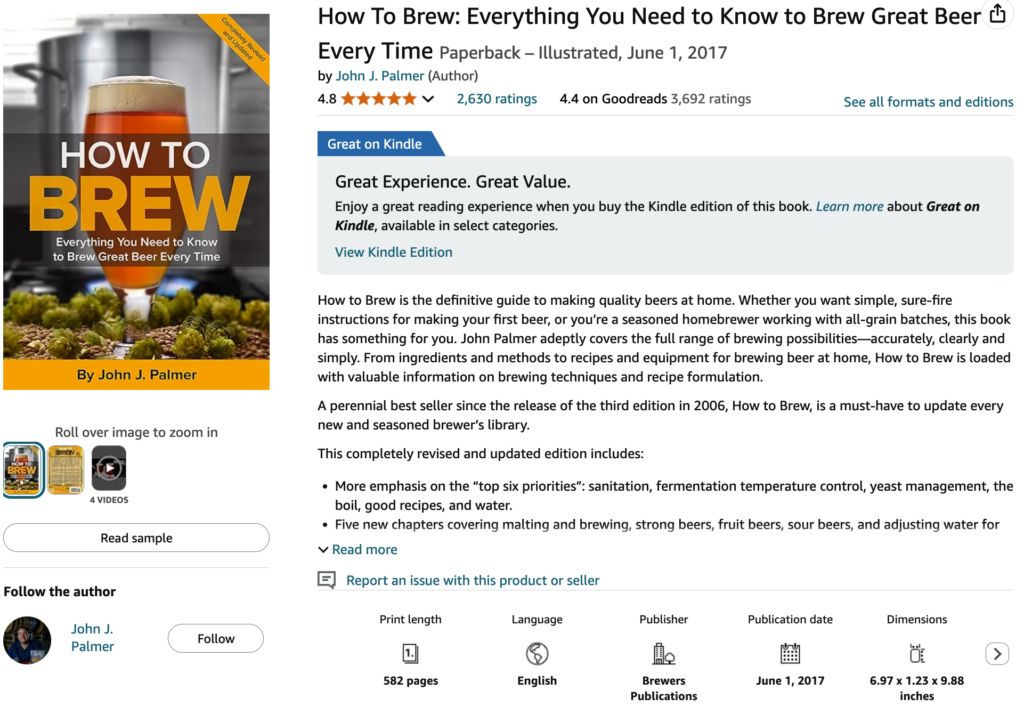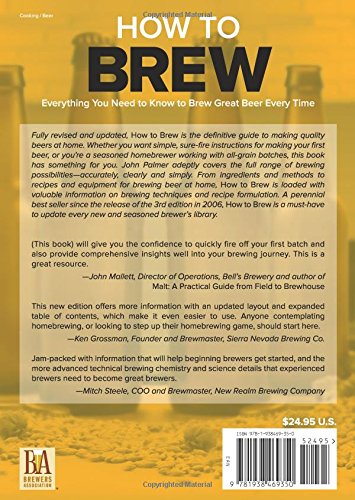
家酿啤酒爱好者的超级宝典!
John J. Palmer 的《How to Brew》被称为家酿啤酒界的“圣经”,对新手和老手来说都是一本必备的参考书。这本书从最基础的知识讲起,逐步带领读者深入酿酒的精髓。Palmer 的写作风格深入浅出,把复杂的酿酒科学解释得简单易懂,包括水质、酵母管理和发酵过程等,真的是“干货”满满!
新版还加入了最新的酿酒潮流、改进的设备建议和更多有趣的配方,帮助酿酒爱好者尝试不同风味的啤酒。书里还有许多实用的“小贴士”和解决问题的方法,特别适合想要提升酿酒技能的人。对于新手,Palmer 准备了简单的入门配方,可以一步步上手,而有经验的酿酒师会发现后面的技术章节非常有用,能帮助自己更上一层楼!
优点:
- 内容超级全面:从原料到高级技术,几乎涵盖了酿酒的方方面面。
- 文字亲切易懂:把酿酒的科学知识讲得清清楚楚、通俗易懂。
- 实用小贴士和故障排除:帮助酿酒者避开常见的“坑”,让酿酒过程更顺利。
- 适合不同水平:从入门到进阶的内容都包含在内,适用范围广。
缺点:
- 高级章节有点技术性:某些高级概念对新手可能有点复杂,不过是选学内容。
- 化学内容偏多:有些读者可能觉得水质和化学的细节太深入了。
总结:How to Brew 是一本超实用的家酿啤酒参考书,理论和实操结合得非常好。无论是刚起步的“萌新”还是想要挑战高难度的酿酒达人,Palmer 的这本书都会是酿酒路上的好帮手。这本书绝对值得每一位热爱家酿啤酒的朋友收藏!


An Essential Resource for Homebrewers of All Levels!
John J. Palmer’s How to Brew is widely celebrated as one of the most comprehensive and accessible resources for both novice and seasoned homebrewers. The book excels in its clear, step-by-step approach, starting with the basics of brewing before gradually introducing advanced techniques. Palmer’s ability to demystify complex brewing science, including water chemistry, yeast management, and fermentation processes, makes this guide stand out from others in the field.
The latest edition includes updated insights on brewing trends, improvements in brewing equipment, and new recipes that allow brewers to experiment with a range of styles. The detailed explanations of different brewing methods and troubleshooting tips are particularly useful for those who want to refine their craft. For beginners, Palmer offers straightforward starter recipes that ease them into the process, while experienced brewers will find the technical chapters invaluable for mastering more intricate brews.
Pros:
- Comprehensive Coverage: From basic ingredients to advanced brewing techniques, it covers nearly everything.
- Clear, Accessible Writing: Palmer breaks down brewing science into digestible concepts.
- Practical Tips and Troubleshooting: Helps brewers avoid common pitfalls and solve brewing issues.
- Adaptability: Recipes and techniques that cater to brewers of various skill levels and equipment setups.
Cons:
- Highly Technical in Later Sections: Some advanced concepts may overwhelm beginners, although they’re optional to learn.
- Lengthy Detail on Chemistry: Some readers may find the in-depth chemistry sections more detailed than necessary.
Verdict: How to Brew is a must-have reference that combines theory with practical advice, making it invaluable for anyone passionate about brewing their own beer. Whether you’re just starting or looking to improve your skills, Palmer’s book is both a practical guide and a technical manual that deserves a spot on every homebrewer’s shelf.
